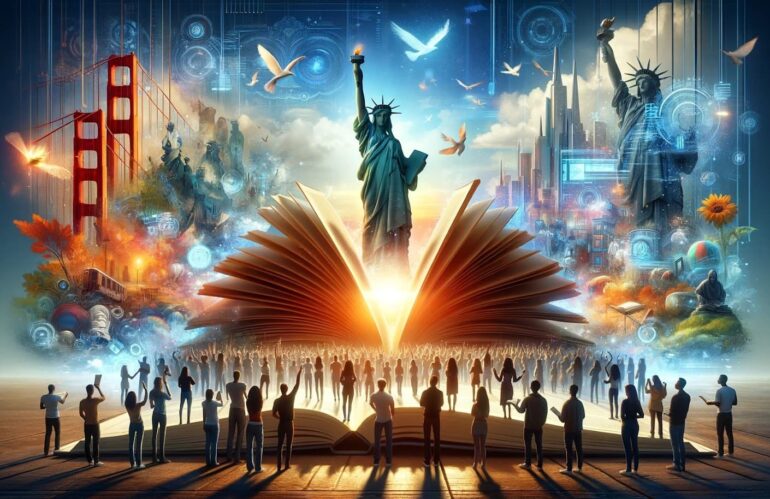In the ever-evolving landscape of American literature, a new generation of authors is emerging, captivating audiences with their innovative narratives, profound insights, and the bold exploration of contemporary themes. These rising stars are not just redefining the boundaries of genres but are also reflecting the multifaceted reality of the American experience in the 21st century. Through a diverse array of voices, they bring to the forefront issues of identity, race, technology, and environmental concerns, engaging with their readers in conversations that are both urgent and timeless. Their works, ranging from novels and short stories to poetry and non-fiction, are marked by a deep engagement with the cultural and social undercurrents of today’s world, offering fresh perspectives and challenging the status quo.
As this new wave of talent flourishes, it’s clear that the future of American literature is in capable hands. These authors, with their unique backgrounds and experiences, contribute to a richer, more inclusive narrative tapestry. Their storytelling prowess not only entertains but also enlightens, pushing the envelope on traditional storytelling and inviting readers into worlds both familiar and astonishingly new. With each page turned, the rising stars in American literature are not only earning critical acclaim but also building a lasting legacy that will inspire future generations of writers and readers alike. Their work stands as a testament to the power of literature to capture the complexities of human experience, making them indispensable voices for understanding the present and imagining the future.
Definition of American Literature
American literature is a rich tapestry of voices, histories, and cultures that reflects the diverse landscape of the United States. From the early days of seeking a distinct identity to the bold experimentation of the 20th century and the contemporary exploration of complex themes, American literature charts a course through the nation’s history and societal shifts. This dynamic evolution continues to shape and challenge our understanding of American life and its enduring human spirit.
| Era | Key Themes | Notable Authors |
| Early American | Distinct Identity, Frontier Life, Democracy | Washington Irving, James Fenimore Cooper, Edgar Allan Poe |
| Romanticism | Nature, Individualism, Slavery, Civil War | Ralph Waldo Emerson, Henry David Thoreau, Walt Whitman |
| Realism & Naturalism | Social Realities, Urbanization, Industrialization | Mark Twain, Edith Wharton, Stephen Crane |
| Modernism | Disorientation, Fragmentation, Experimentation | F. Scott Fitzgerald, Ernest Hemingway, T.S. Eliot |
| Harlem Renaissance | Black Identity, Racial Prejudices, Artistic Expression | Langston Hughes, Zora Neale Hurston, Countee Cullen |
| Contemporary | Diversity, Equality, Identity, Technological Reflections | Toni Morrison, Jhumpa Lahiri, Ta-Nehisi Coates |
Significance of Rising Stars
The emergence of rising stars in literature holds profound significance for both the artistic landscape they shape and society as a whole. These new voices offer fresh perspectives, challenge norms, and mirror the evolving concerns of contemporary life. Here are some key areas where the significance of rising stars in literature is evident:
Pushing Boundaries of Genre and Form:
- Rising literary stars are pivotal in pushing the boundaries of genre and form. Through their experimentation with narrative structures, styles, and themes, they innovate and rejuvenate literary traditions. Their exploration often leads to the emergence of new genres or subgenres and revitalizes existing ones, ensuring the literary world remains dynamic and responsive. For instance, the rise of digital literature and hybrid genres can often be credited to newer authors exploring the possibilities enabled by technology and evolving reading habits.
Amplifying Underrepresented Voices:
- Rising stars in literature frequently reflect and amplify underrepresented voices and perspectives. By foregrounding diverse backgrounds, identities, and experiences, these authors enrich literature with stories that historically have been marginalized. This diversity fosters empathy, understanding, and inclusivity among readers, creating a more nuanced appreciation of the human experience.
Engaging with Contemporary Issues:
- These emerging authors play a pivotal role in engaging with contemporary issues and dilemmas. Whether addressing climate change, social justice, technological advancements, or globalization, rising stars contribute to shaping public discourse. Their works provoke thought, inspire action, and participate in crucial societal debates, highlighting literature’s relevance in navigating the complexities of modern life.
In essence, the significance of rising stars in literature extends far beyond their individual achievements. They are harbingers of change, champions of diversity, and custodians of the narrative art form, ensuring that literature remains a vital, evolving expression of human culture.
Modern Rising Stars in American Literature
The landscape of American literature is continually rejuvenated by the emergence of modern rising stars, authors whose works capture the essence of contemporary life and push the boundaries of narrative and form. These authors, diverse in background and perspective, are defining the next chapter of American literary tradition with their innovative approaches and insightful explorations of modern themes such as identity, technology, social justice, and environmental concerns. Here are a few notable figures who represent the modern rising stars in American literature:
- Ocean Vuong – A Vietnamese American poet and novelist, Vuong’s debut novel “On Earth We’re Briefly Gorgeous” has been acclaimed for its lyrical prose and exploration of family, identity, and the immigrant experience. His work is a poignant reflection on trauma, love, and the complexities of the human condition, marking him as a powerful voice in contemporary literature.
- Tommy Orange – With his novel “There There,” Orange brings to the forefront the lives of urban Native Americans, weaving a complex narrative that explores themes of identity, heritage, and the ongoing impact of history on present-day lives. His work is a testament to the resilience and richness of Indigenous cultures in America.
- Brit Bennett – Bennett’s novels, including “The Vanishing Half” and “The Mothers,” explore themes of race, family, and identity with compelling narratives and deep emotional resonance. Her exploration of the African American experience, through intimate portraits of her characters’ lives, has made her one of the most compelling voices in recent years.
- Carmen Maria Machado – Machado’s work spans short stories, essays, and memoir, all marked by her innovative approach to form and her exploration of themes related to the female experience, queerness, and the body. Her critically acclaimed memoir “In the Dream House” and her short story collection “Her Body and Other Parties” showcase her unique voice and storytelling prowess.
- Yaa Gyasi – With her novels “Homegoing” and “Transcendent Kingdom,” Gyasi explores the African diaspora, intergenerational trauma, and the search for identity across continents and centuries. Her work is notable for its historical depth, emotional intensity, and the exploration of themes like family, faith, and the legacies of slavery.
These authors, among others, are not just shaping the future of American literature; they are also engaging with the pressing issues of our time, offering narratives that challenge, inspire, and provoke thought. Their works reflect the diversity and dynamism of the American experience, highlighting the importance of storytelling in understanding ourselves and the world around us. As modern rising stars, they carry forward the rich legacy of American literature, promising a vibrant and inclusive future for the literary world.
Conclusion
The evolution of stars in American literature provides a fascinating lens through which to view the broader narrative of American history and culture. From the early settlers’ reflections on their new environment to the digital age’s exploration of identity and technology, these literary figures have not only mirrored the society around them but also shaped it, challenging readers to see the world through different eyes and understand it in new ways. The diversity of voices that have risen to prominence over the centuries reflects the complex tapestry of American society itself, with each new generation of writers bringing fresh perspectives and insights to the ongoing conversation about what it means to be American.
The significance of these literary stars extends beyond their contributions to the canon of American literature; they have also played a crucial role in fostering a culture of inquiry, empathy, and dialogue. Through their works, they invite us to question, to feel, and to connect, offering up visions of America that are as varied as they are compelling. As American society continues to evolve, so too will its literature, with future stars likely to emerge from corners of the country and aspects of experience that are only just beginning to find their voices.






